How to Film in Brooklyn and Keep the Neighbors Happy
As the TV-and-movie business booms and crews proliferate, a Bushwick production showed how to bring the love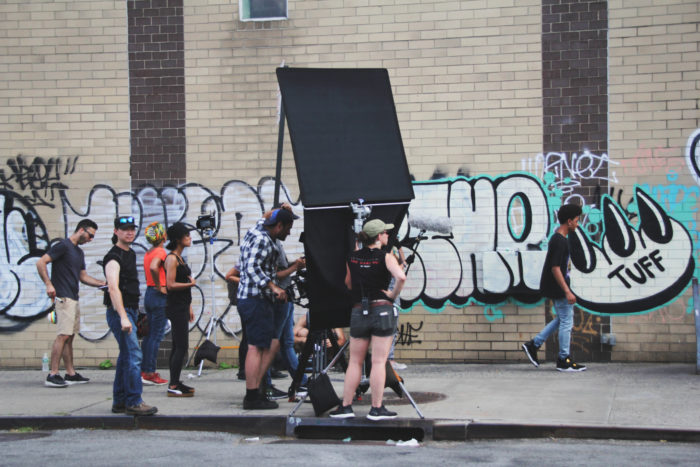
A film crew for the forthcoming feature "Bushwick Beats" on location in July (Photo by Alia Azamat)
While the increasing number of TV-and-film crews shooting on Brooklyn streets can sometimes feel like an invading army, the team behind Bushwick Beats brought on something more like a neighborhood love-fest. The indie film, which wrapped at the end of July, is an anthology of six stories, by six directors, all made in the streets and buildings of Bushwick. The production came across as a model of how to do business in a way that embraces the community rather than just using it as a backdrop. The producers cast diverse local actors, bought supplies from small-business owners and infused the story with neighborhood character. “There’s such a diverse community and a lot of history here. There’s so much happening in the neighborhood,” one of the producers, Julie Christeas of Tandem Pictures, told The Bridge. “It’s been really awesome filming here.”
TV-and-film production in New York City has ramped up sharply in recent years. For the most part, it has been a bonanza. In June, Mayor de Blasio’s office announced that the 2016-17 season set the record for the most TV shows shooting in the city, at 56, up from just 14 in 2007-08. Many have been shot entirely or partially in Brooklyn, including Amazon’s Mozart in the Jungle and Fox’s Gotham. Just this week, Disney announced that it’s more than doubling its production of Marvel superhero TV episodes in New York state, to 135 episodes by the end of this year.
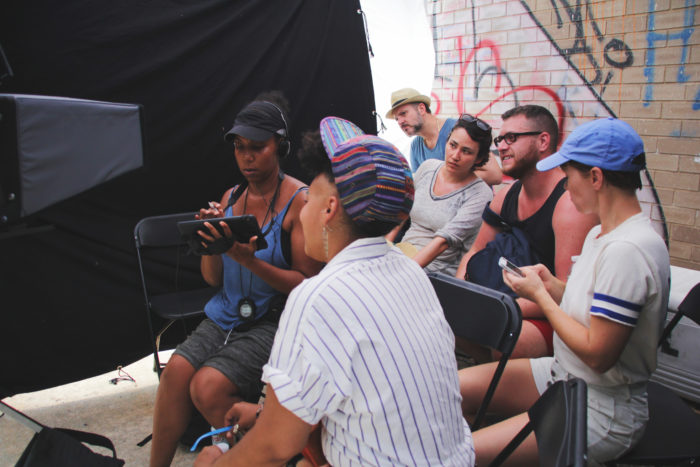
A team for Bushwick Beats keeps an eye on the production (Photo by Alia Azamat)
The economic impact on the city has been epic, according to a study cited by the mayor’s office: an estimated $9 billion in economic activity, $400 million in city tax revenues and more than 130,000 jobs, from carpenter to makeup artist. Part of the incentive luring all this business is New York’s tax credits: 30% of production costs incurred in the state.
Even so, among many New Yorkers, the no-parking signs and orange cones that announce the coming of a film crew bring on a sense of irritation if not dread. Certain picturesque neighborhoods get hit the hardest: 888 film permits were issued in 2014-16 in Community Board 6, which includes Cobble Hill and Park Slope. All the accoutrements of film production just add to the offense: the imperious production assistants, the buzzing generators, the groaning craft tables of food for pampering the crew. Some community groups, beyond just complaining, have even responded by hitting up the film crews for donations, Brooklyn Paper reported. The president of one such group, Peter Bray of the Brooklyn Heights Association, described the reputation of film companies in the neighborhood as “overwhelmingly negative.”
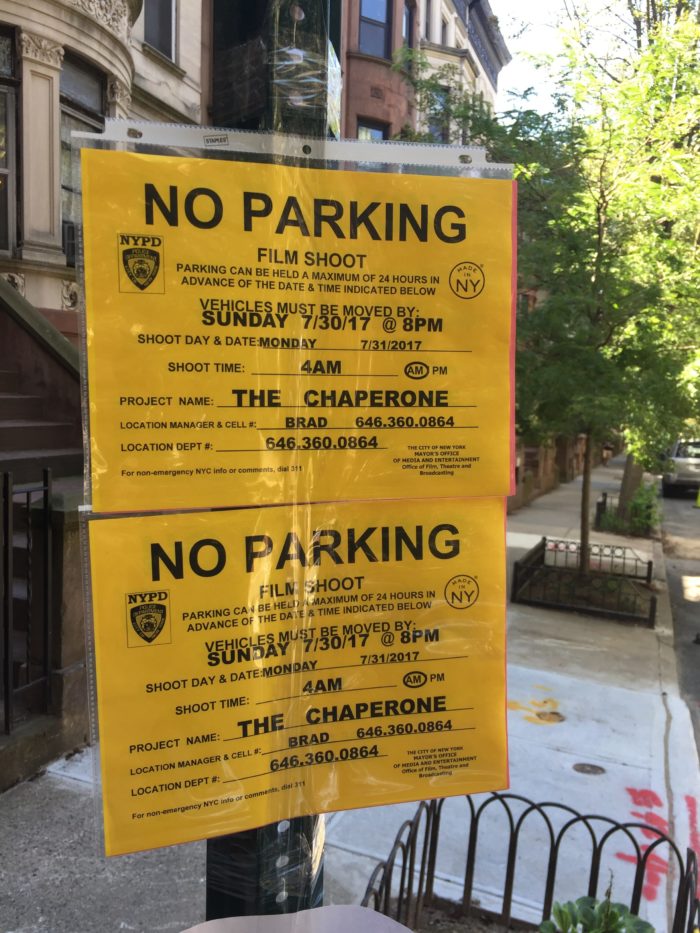
How neighbors typically get the news about parking restrictions for film shoots (Photo by Steve Koepp)
City officials have been working overtime to counter that perception by making sure more New Yorkers feel the benefits of living in a cultural powerhouse. The city has launched programs to target three groups in particular: small-business owners, filmmakers who are women and people of color, and students dreaming of getting into the business. On the street level, the city has tried to “foster a mutually beneficial experience when productions shoot on location in our neighborhoods,” said Julie Menin, commissioner of the Mayor’s office of Media and Entertainment (MOME), in testimony to the city council in February. “We have revoked permits when productions have failed to adhere to our requirements,” she added.
Bushwick Beats had a good opportunity to hit all those notes, especially given the gentrification of the neighborhood. One of its locations was the Bushwick School for Social Justice, a small public high school. “When we went to go speak with the principal about the project and getting permission to film in the school,” said producer Christeas, “one of the reasons that she loved it so much was because she said that often these kids feel like Bushwick is moving on without them, that it’s not taking them on the journey that it’s going on. And it’s so wonderful to have you guys in the school because it makes our kids feel like they’re a part of the change and the growth that’s happening.”
The Bushwick Beats production focused on employing Brooklyn-based catering companies as well. “There’s a company we used called Émigré Gourmet, which specializes in employing women from other cultures who come here,” said Kristie Lutz, the movie’s line producer. “We had some really wonderful food, from Bangladeshi cuisine to Mexican cuisine. And then our other caterer is a formerly incarcerated woman, Sharon Richardson, whose company is called Just Soul Catering. She got out of jail about three years ago and started this company and it’s been really awesome working with her too.”
Every morning during production, the company dined on breakfast from Bushwick-based Square Meals. Added Christeas: “Being New Yorkers, I think that it’s always important to us to use as many local people, restaurants, artists as possible. We were able to use a lot of local artists who did some of the murals in the community, to use their work in the film. We’ll be using some local music and bands in the film.”
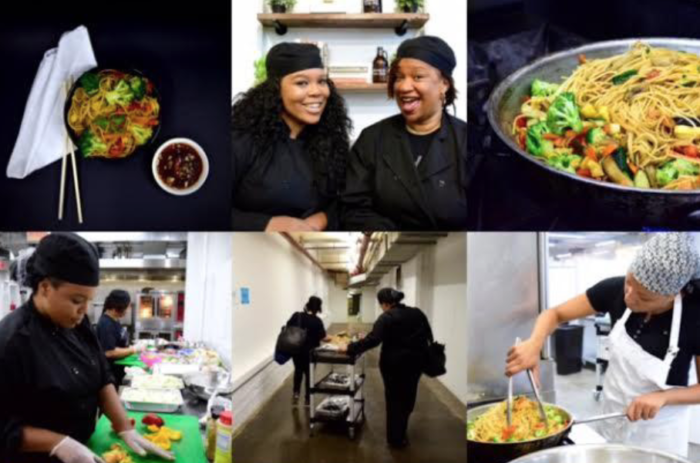
A medley of images of the Just Soul Catering team at work (Photos courtesy of Just Soul Catering)
Even if a movie’s focus is not a particular neighborhood, there are ways to be a good show-biz citizen. To get the word out, the mayor’s office of media recently launched a campaign of public-service announcements to show how the film business works for New York City. The PSA campaign features companies attesting to how the TV-and-film industry has helped their business in one shape or form.
One is the now-famous Cafe Grumpy, which started in Greenpoint and was featured in the hit HBO series Girls. The first big order that the company received was from a film shoot, explains Cafe Grumpy owner Caroline Bell in one of the PSAs. “They came in right before close and ordered 75 drinks, probably more drinks than we had sold the entire week. It was incredible. Without that business, we couldn’t have opened our second store.” The company now has eight locations.
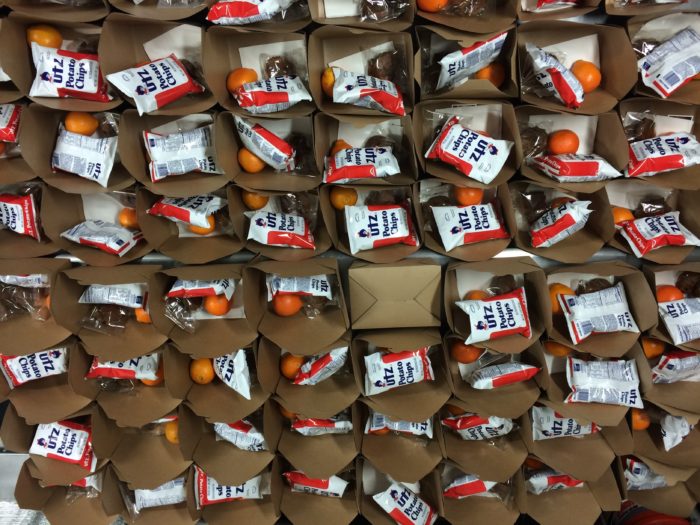
Box lunch bonanza: a stack of meals in production by Square Meals (Photo courtesy of Square Meals)
Bridge Cleaners & Tailors, which has a facility situated near Brooklyn’s Steiner Studios, America’s largest production studio outside of Hollywood, has benefited from big orders too. “The precision that the studios require, I can provide every time,” says Bridge Cleaners owner Victoria Aviles, in a PSA. Added her son, Richard, who serves as president of the company: “Film productions, they might bring us 1,000 pieces in an order.”
Bushwick Beats aims to release its deep dive into the neighborhood in 2018. Not coincidentally, perhaps, the film’s six stories are all variations on the theme of unconditional love, with titles like Love Trumps Hate, Long Time Distance and No Matter What.













